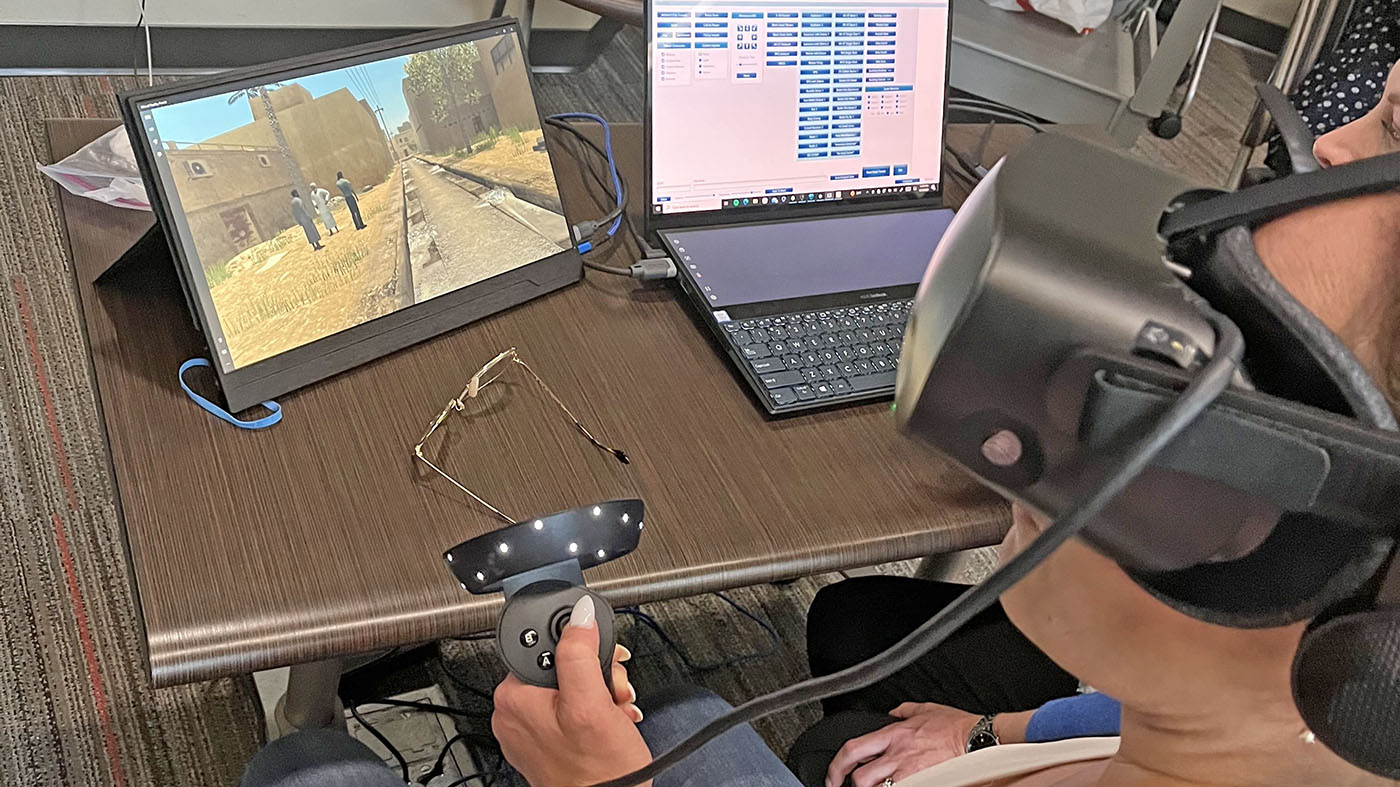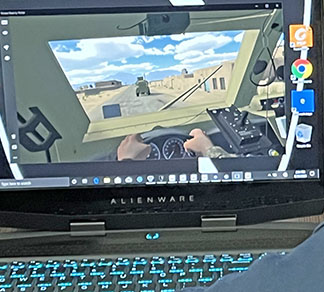Gulf Coast VA and VA Immersive are working to define a new reality in health care by broadening implementation of a virtual reality (VR) exposure therapy system called BraveMind.
BraveMind was developed by Dr. Albert Rizzo and his team at the University of Southern California’s Institute for Creative Technologies. It creates 14 “worlds” of combat scenarios from a desert roadway to a crowded Iraqi marketplace to a remote Afghan village. It allows Veterans to confront traumatic experiences in a highly controlled, clinical environment.
Training clinicians for national use
Gulf Coast VA recently hosted training to teach VA clinicians from VA facilities across the nation how to use this innovative technology with Veterans experiencing post-traumatic stress (PTS) and post-traumatic stress disorder (PTSD).
VA psychologist Dr. Natalia Marin shared her enthusiasm to begin using this technology with her patients: “This type of technology gives clinicians another tool to be able to help with prolonged exposure treatment for Veterans. Virtual reality can help to make the treatment more attractive and provide a gateway to Veterans to engage in their treatment who may otherwise avoid prolonged exposure treatment,” Marin said.
Through a collaboration with the nonprofit organization Soldier Strong and VA’s Office of Healthcare Innovation and Learning, approximately 29 VA Medical Centers have received the BraveMind system as a donation. Soldier Strong is dedicated to supporting Veterans take their next steps forward in life after service by connecting them with revolutionary medical technologies.
A safe approach to behavioral avoidance
With the BraveMind system, therapists can select a world based on a Veteran’s traumatic experience and customize it in the VR headset, placing Veterans back into the difficult memories they may be avoiding but at a pace they can handle safely.
Clinicians can customize and control the content presented in the headset so precisely—including sights, sounds, smells and even the weight and tactile sensation of holding a service weapon—that patients feel immersed in the traumatic memory. With the support from their trained VA clinician, Veterans can confront and re-process their traumatic experience.
“Utilizing the VR technology in BraveMind gets Veterans to talk about things they’ve never talked to anyone about before. Those memories don’t have the same emotional power they did before because repeatedly experiencing those troubling memories in a safe environment reduces the brain’s response to them,” Dr. Rizzo explained.
Biloxi training attendee Dr. Julia Owenshoal, a psychologist at Boise VA, noted: “This will be helpful for Veterans who are having a hard time visualizing situations since it is so immersive and really makes you feel like you are there. Using virtual reality is a step up from the rudimentary things we have been doing in an attempt to elicit more immersive experience.”
VA at the forefront of health care innovation
Immersive technology, particularly VR, is at the forefront of disruptive innovations in health care, and VA is helping pave the way forward. By using an engaging and immersive modality to teach important response skills and help process trauma response, VA is able to provide more tools to clinicians and offer additional resources to Veterans.
VA Immersive has currently deployed over 1450 VR headsets across more than 165 VA medical centers and outpatient clinics in all states, Puerto Rico, Guam and American Samoa.
Topics in this story
More Stories
Study underscores important role COVID vaccination can have in protecting Veterans from infection and reducing long-term health consequences
Columbia VA’s robotic surgery teams completed their 800th robotic surgery and are on schedule to hit 1,000 by the end of the year.
In a decentralized clinical trial, Veterans can participate from their own homes or local VA instead of having to travel to a research site.








This is wonderful for the boots on the ground guys!! What about the guys above the ground? There are many aviation specialties the experienced stress as part of their every day job. Not just the obvious pilots, but loadmasters, flight engineers and other men and women who experienced major stress flying into and out of some pretty stressful environments – without weapons to defend ourselves.